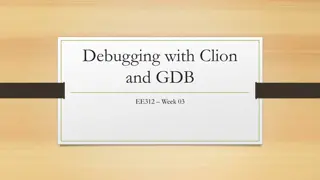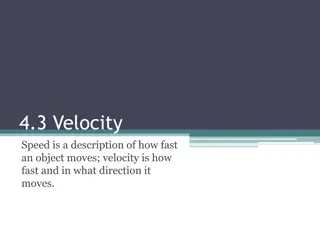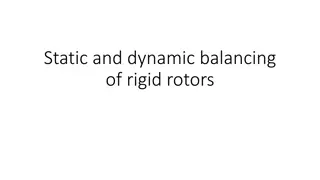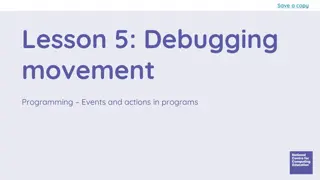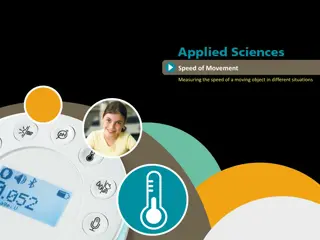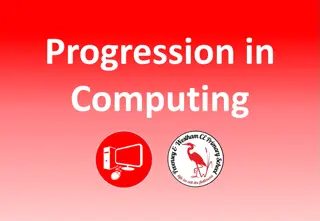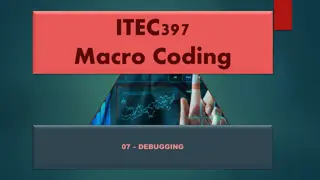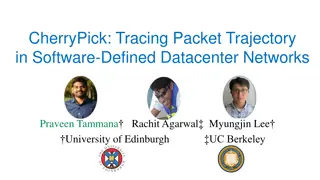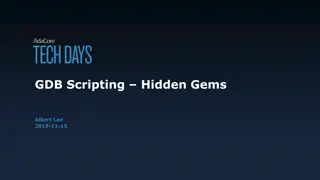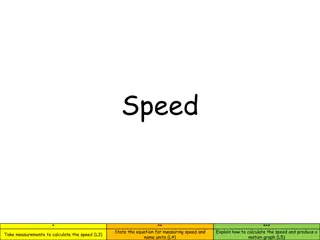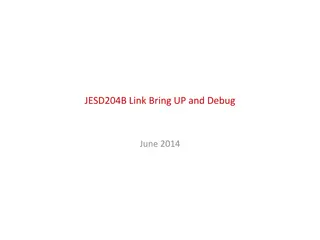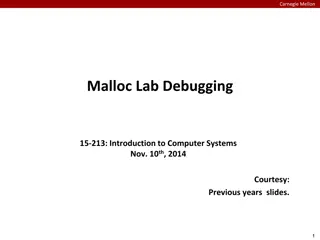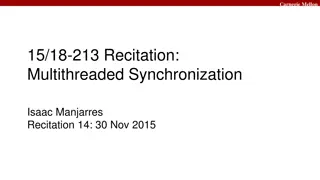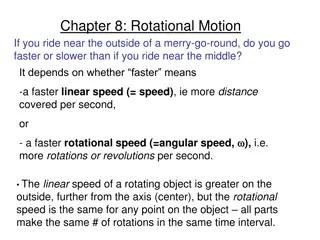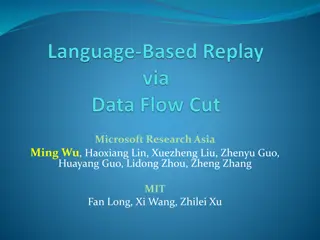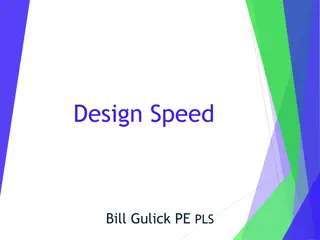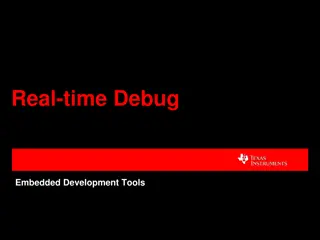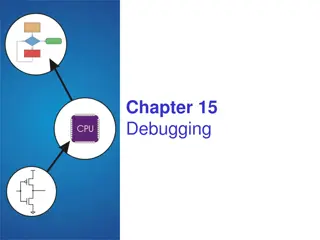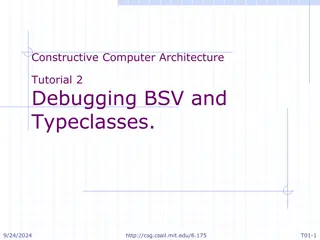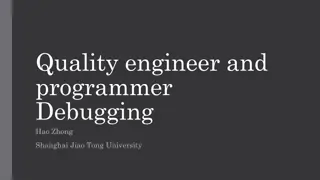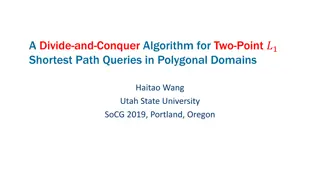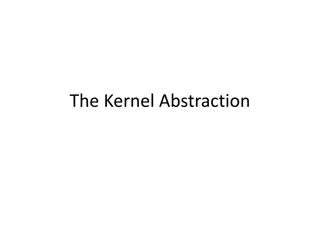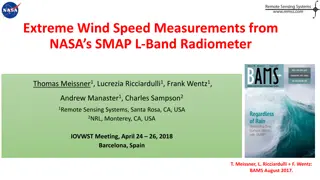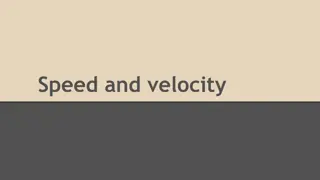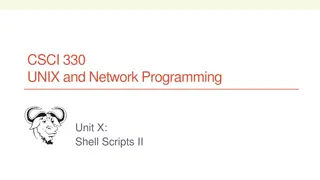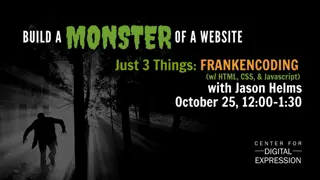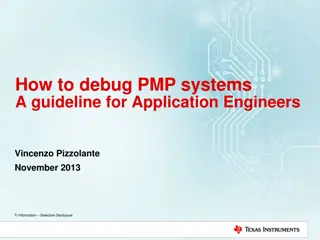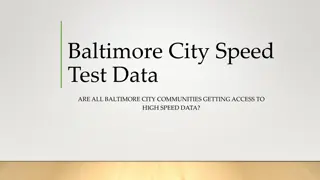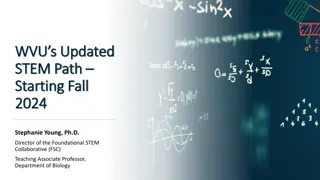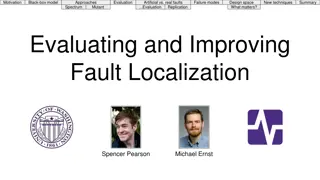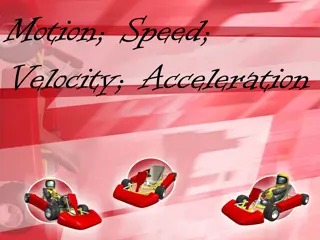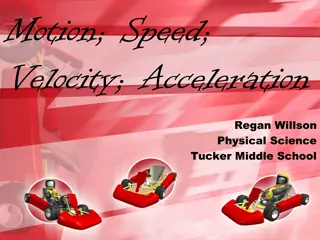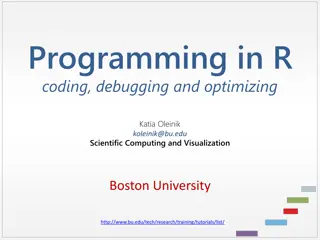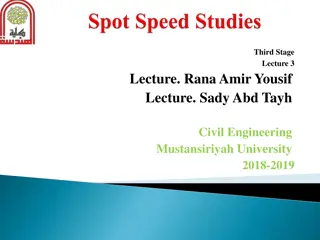Effective Debugging Techniques Using Clion IDE and GDB
Understanding the necessity of debugging in code development, exploring common debugging techniques, utilizing GDB for debugging, and working with Clion IDE debugger for efficient program debugging. Learn how to debug buggy programs, set breakpoints, print values, and run programs in debug mode for
0 views • 10 slides
Understanding Velocity vs. Speed in Physics
Velocity and speed are fundamental concepts in physics that describe how fast an object is moving and in what direction. While speed is a scalar quantity representing the rate of motion, velocity is a vector quantity that includes both speed and direction. Constant velocity implies steady speed and
0 views • 8 slides
Understanding Rigid Rotor Balancing and Critical Speed
Explore the concepts of static and dynamic balancing of rigid rotors, determining when a rotor can be assumed rigid based on speed, examining Jeffcott rotor critical speed problems, and discussing the simplest model of rotor systems. Learn about rotor imbalance, free vibrations, natural frequency, a
1 views • 29 slides
Debugging Movement Programming Events and Actions
Explore the process of debugging in programming, focusing on identifying and fixing bugs in a program. Learn how to test a program against a given design, match code to outcomes, and modify programs using existing designs. Engage in practical activities to improve your debugging skills.
0 views • 21 slides
Understanding Speed of Movement in Different Situations
Exploring the concept of speed in the context of moving objects, this activity aims to analyze changes in speed, create hypotheses, and test them using a built-in GPS sensor. The theoretical background covers the definition of speed, its relation to distance and time, as well as the distinction betw
2 views • 27 slides
15-213 Recitation: Bomb Lab Overview and Tips
This content covers the Bomb Lab exercise in x86-64 assembly code and GDB debugging techniques. It explains the purpose of Bomb Lab, downloading the bomb, detonating the bomb, hints for solving phases, and x86-64 Linux register usage. The material emphasizes the importance of using GDB for efficient
1 views • 42 slides
Understanding Centrifugation: Industrial and Laboratory Applications
Centrifugation is a procedure that utilizes centrifugal force to separate components based on density in mixtures for both industrial and laboratory purposes. This process involves the rotation of particles at high speeds to induce sedimentation. Different types of centrifuges, such as low-speed and
0 views • 18 slides
Progression in Computing: National Curriculum Overview for KS1 and KS2
Explore the comprehensive National Curriculum guidelines for Key Stage 1 (KS1) and Key Stage 2 (KS2) students focusing on Information Technology and Computer Science. Topics covered include understanding algorithms, creating and debugging programs, using technology purposefully, developing logical r
0 views • 48 slides
Understanding Debugging in Programming
Debugging is a crucial aspect of programming to identify and fix errors that can cause program failures, hangs, or unexpected results. There are different types of errors such as compile errors, runtime errors, and logic errors, each requiring a different approach to resolve. Learning about the mode
0 views • 20 slides
Understanding Circular Motion in Physics
Circular motion involves objects moving in a circular path at a constant speed, experiencing acceleration and centripetal force. This motion is characterized by angular speed, centripetal acceleration, and the necessary centripetal force. The concept of uniform circular motion and angular displaceme
3 views • 38 slides
Enhancing Network Debugging with CherryPick in Software-Defined Datacenter Networks
Explore CherryPick, a technique for tracing packet trajectory in software-defined datacenter networks. It helps in debugging by ensuring data plane conforms with control plane policies, localizing network problems, and enabling packet trajectory tracing challenges like non-shortest paths. CherryPick
0 views • 14 slides
A Dive into GDB Scripting Hidden Gems with Albert Lee
Delve into the world of GDB scripting hidden gems with Albert Lee on November 15, 2018. Explore essential features like debugging, register inspection, low-level memory views, and source-level code analysis. Understand techniques to enhance your debugging skills through the exploration of assembly c
0 views • 22 slides
Understanding Speed and Motion: Equations, Calculations, and Graphs
Speed is defined as the distance traveled per unit of time and is measured using the equation Speed = Distance/Time, with units typically in meters per second (m/s). To calculate speed, measure the distance traveled and the time taken. Motion graphs can be used to visualize speed by plotting time on
2 views • 11 slides
Understanding and Debugging JESD204B: Practical Guide
This guide provides a comprehensive overview of understanding and debugging JESD204B interfaces. From achieving CGS and ILAS phases to troubleshooting user data alignment issues, it covers essential steps and tips for successful implementation and debugging. The content includes an introduction to t
0 views • 32 slides
Debugging Tips for Carnegie Mellon's Malloc Lab
Explore essential debugging strategies for the Carnegie Mellon Malloc Lab, focusing on identifying errors, resolving segfaults, and implementing a heap checker to maintain well-formed heaps. Learn how to efficiently troubleshoot issues and improve your debugging skills in computer systems.
0 views • 19 slides
Carnegie Mellon Multithreaded Synchronization Recitation
Explore Carnegie Mellon's recitation on multithreaded synchronization, debugging tools, shared memory synchronization, critical sections, and locking. Dive into the Echo Server Sequential Handling code examples, finding weaknesses using telnet, and advanced debugging techniques with curl and binary
0 views • 34 slides
Understanding Path Dependence in Operational Research
Path dependence plays a crucial role in Operational Research (OR) affecting outcomes based on the path followed. This concept is evident in various aspects of OR processes like problem framing, model choice, data collection, and implementation. Recognized early in OR literature, path dependence high
0 views • 32 slides
Understanding Rotational Motion: Linear vs. Angular Speed
Exploring the concept of rotational motion, this content delves into the comparison between linear speed (tangential speed) and rotational speed (angular speed). It discusses how the linear speed varies based on distance from the axis of rotation, while the rotational speed remains constant for all
0 views • 27 slides
Enhancing Replay Interface Efficiency in System Debugging
Efforts by researchers at Microsoft Research Asia and MIT focus on enhancing replay interface efficiency for system debugging. The motivation stems from the non-determinism challenges caused by time, user input, network I/O, and thread interleaving. The study observes that only certain parts of a pr
0 views • 26 slides
Understanding Design Speed in Highway Engineering
Design speed in highway engineering refers to the selected speed used to determine the geometric features of roadways. It has evolved over time, with the current definition emphasizing safety, driver expectations, and balancing various factors like social, environmental, and economic considerations.
0 views • 12 slides
Understanding Real-time Debug Techniques for Embedded Development
Real-time debugging in embedded systems involves different modes like stop mode and real-time mode, each offering unique capabilities for accessing memory, registers, and handling interrupts. This technique allows developers to examine and modify memory contents while the processor is running, enabl
0 views • 32 slides
Understanding Debugging in High-Level Languages
Debugging in high-level languages involves examining and setting values in memory, executing portions of the program, and stopping execution as needed. Different types of errors – syntactic, semantic, and algorithmic – require specific debugging approaches. Syntactic errors are related to code l
0 views • 9 slides
Simplifying Post-Silicon Timing Diagnosis with NGSPA Tool
Explore how the NGSPA tool by Intel simplifies post-silicon timing diagnosis, replacing costly machines with a CAD application running on an x86 server, saving resources and enabling parallelized CAD operations. Learn about the challenges in post-silicon speed debugging, the importance of static tim
0 views • 26 slides
Debugging Techniques in Constructive Computer Architecture
Explore debugging methods in constructive computer architecture tutorial sessions, focusing on debugging BSV code, typeclasses, and functional style. Learn how to use print and display statements effectively, handle conflicts, and identify and fix common bugs. Dive into the significance of ways to d
0 views • 40 slides
Advanced Strategies for Effective Debugging in Software Development
Learn about quality engineering, programming, bug detection techniques, and common challenges in debugging complex software. Explore real-world scenarios, such as debugging Mozilla Firefox and handling various bugs in different environments like compilers, databases, and operating systems.
0 views • 35 slides
Divide-and-Conquer Algorithm for Two-Point Shortest Path Queries in Polygonal Domains
In this research presented at SoCG 2019, a new divide-and-conquer algorithm is proposed for efficiently handling two-point shortest path queries in polygonal domains. The algorithm offers significant improvements in preprocessing space and query time compared to previous methods, making it a valuabl
1 views • 19 slides
Strategies to Reduce Time Spent Debugging in Software Development
Strategies for reducing debugging time in software development include producing working code with minimal effort, optimizing processes involving code and computer, forming hypotheses to explain bugs, conducting tests, using best practices, and conducting experiments for effective debugging. Signifi
0 views • 50 slides
Understanding Extreme Wind Speed Measurements from NASA's SMAP L-Band Radiometer
NASA's SMAP (Soil Moisture Active Passive) mission has been collecting data on extreme wind speeds since April 2015 using an L-band radiometer. The measurements provide valuable insights into wind speed frequencies, with a wide range of signals received by the sensor challenging the data analysis. A
0 views • 17 slides
Understanding Speed and Velocity in Physics
Speed and velocity are fundamental concepts in physics. Speed is a scalar quantity that can be average or instantaneous, while velocity is a vector quantity that includes direction. Equations such as v=d/t help calculate these values. Average speed and average velocity are important in determining t
1 views • 10 slides
Debugging Techniques in Shell Scripting: CSCI 330 UNIX and Network Programming Overview
Explore the debugging techniques presented in the CSCI 330 UNIX and Network Programming course, including using echo statements, the set command for tracing execution, and the case statement for decision making. Learn how to troubleshoot errors in shell scripts efficiently.
0 views • 29 slides
Coding Tips and Practices for Success
Explore essential coding practices such as working with linked files, debugging techniques, rubber duck debugging, frank encoding, and more to enhance your coding skills and efficiency. Discover the core elements of HTML, CSS, and JavaScript and learn how to optimize your coding process for better r
0 views • 14 slides
Debugging PMP Systems: A Guideline for Application Engineers
Comprehensive guideline by Vincenzo Pizzolante on debugging PMP systems for application engineers, covering topics like analysis, technical aspects, layout guidelines, trace inductance, case studies, and dealing with noise generators. Includes real-life examples and actionable solutions for managing
0 views • 33 slides
Baltimore City High-Speed Data Access Analysis
The Baltimore City Speed Test Data analysis examines the internet speed access in various communities within Baltimore City. The report includes details on average download speeds, communities with the lowest speeds, and a comparison of internet speed requirements for different online activities. Th
0 views • 7 slides
New STEM Path Update for Fall 2024 - Exciting Changes Ahead
Explore the latest update to the STEM path at WVU starting Fall 2024, designed to provide a better-aligned, streamlined, and more accessible path for students through introductory coursework in Biology, Chemistry, Mathematics, and Physics. The updated path includes changes in course placements, prer
0 views • 20 slides
Exploring Fault Localization Techniques in Software Debugging
Various fault localization techniques in software debugging are discussed, including black-box models, spectrum evaluation, comparison of artificial and real faults, failure modes, and design considerations. The importance of effective fault localization and improving fault localization tools is hig
0 views • 24 slides
Understanding Motion, Speed, Velocity, and Acceleration
Motion is when an object changes its place or position. To describe motion accurately, consider the start and end position, movement relative to a reference point, distance traveled, and direction. Speed refers to the distance traveled per unit of time and can be calculated using the formula speed (
0 views • 25 slides
Understanding Motion, Speed, Velocity, and Acceleration in Physical Science
Explore the concepts of motion, speed, and velocity along with practical examples and calculations. Learn to describe motion, calculate speed using formulas, solve speed math problems, and understand the different ways to calculate speed. Dive into the world of physical science with explanations and
0 views • 26 slides
Introduction to Programming in R: Coding, Debugging, and Optimizing
Explore the world of programming in R with a focus on coding, debugging, and optimizing techniques. Learn from Katia Oleinik at Boston University about scientific computing and visualization in R. Discover the power of if statements, comparison operators, and enhance your skills in R programming.
0 views • 73 slides
Understanding Spot Speed Studies in Traffic Engineering
Spot speed studies are essential in estimating vehicle speeds in traffic streams, aiding in establishing traffic parameters, control measures, and safety evaluations. These studies involve recording vehicle speeds at specific locations to analyze speed trends, set speed limits, and assess the impact
0 views • 17 slides
Exploring Speed and Distance Estimation in Speed Trap Lab
Dive into the world of speed and distance estimation with the Speed Trap Lab. Learn how to calculate speed and distance, taking into consideration uncertainties and variations in time measurements. Explore the relationship between distance, time, and speed through engaging visual aids and practical
0 views • 4 slides
